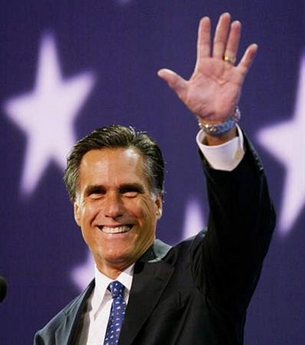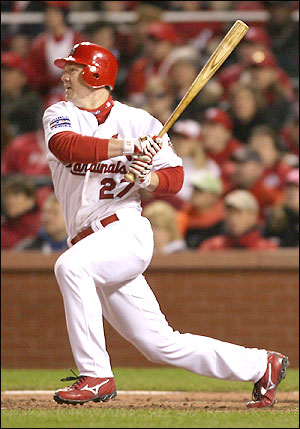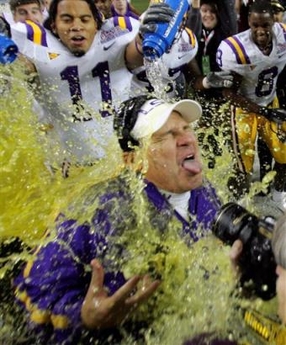« Archive for January, 2008
posted by
Shawn, on January 30th, 2008 at 01:16 pm, in category Uncategorized
Good work at Biz of Baseball regarding the economy’s potential effect on baseball’s revenues. Sometimes two different people can see two different things when looking at the same exact numbers. Tim Marchman made the case that baseball is pretty much recession-proof:
Moreover, in historical terms, recession has been, if anything, good for baseball. Since the end of World War II, five recessions have started during the off-season and lasted into the season. None of them harmed attendance at all: Baseball fans are a hardy and dedicated lot…
Examples abound. In 1969, the 24 teams drew 1.15 million fans per team. During a recession that began that December, and lasted until November 1970, attendance increased to 1.25 million per team. More recently in 2000, baseball set a new attendance record at 73 million; the next year, despite a meltdown in technology stocks, it drew 73 million again. [...]
posted by
Shawn, on January 29th, 2008 at 05:07 pm, in category Uncategorized
This might be jumping the gun, but Bob Nightengale is reporting that the Mets and Twins reached a deal for Johan Santana today, pending a contract extension. My quick thoughts, assuming the report is accurate:
- The package the Twins got is not to my liking. Reasonable upside, but not nearly enough guaranteed return. Humber has already been Tommy John-ed; Gomez is a career .278/.336/.399 minor league hitter with limited experience above AA; Mulvey was good-but-not-great at AA Binghamton last year; and Guerra will still be 18 on opening day. That Minnesota couldn’t pry away Fernando Martinez is obviously a pretty big disappointment.
- If any of them has a chance to succeed immediately, it’s Humber, who was the third overall pick coming out of Rice in 2004. He put up a decent enough 120/44 K/BB ratio in 139 innings at New Orleans last year (in the hitter friendly PCL), but has some trouble keeping the ball down. In other words, he’s not Philip Hughes, who the Twins likely could have had if they had pulled the trigger two months ago.
- Obviously, this makes the Mets a much better team immediately, although their rotation still isn’t great (and signing Livan Hernandez won’t really help things). It also means they are ready to sign Santana to a “six- or seven-year contract extension,” possibly going through 2015. That’s a long time to commit to a pitcher, no matter who he is. I personally wouldn’t do it, but if it helps them win a World Series…
That’s it for now. We’ll see how the contract negotiations unfold. Should be interesting to see how much they’re willing to spend.
Feedback? Write a comment, or e-mail the author at shawn(AT)squawkingbaseball.com
posted by
Shawn, on January 29th, 2008 at 07:07 am, in category Uncategorized
Good job by Neal Huntington last week. We’ve been back and forth on him this offseason, so here’s another check mark on the plus side.
As everyone well knows, he’s been put in a very tough situation. The Pirates are a bad team with few valuable assets and an unproductive minor league system. The Major League roster is older than people think, there’s little on the way, and only Freddy Sanchez is near his peak trade value.
In other words, short of trading Sanchez (which they should do, regardless of the P.R. nightmare that would ensue) or pulling off a miracle deal for Jason Bay or Xavier Nady or Matt Morris, Huntington’s hands are pretty much tied this offseason. And for a team facing their sixteenth straight losing season (which would tie a Major League record), doing nothing isn’t exactly the best way to endear yourself to the public. [...]
posted by
Shawn, on January 24th, 2008 at 07:14 am, in category Uncategorized
Great article by Maury at Biz of Baseball Tuesday. Here’s an excerpt:
Books and articles have been written with large sections devoted to placing a figure on this Star Power dynamic. They roll a laundry list of revenue streams into the conversationÉ merchandising, television, radio, increase in repeat season-ticket purchases, increased concessions, all based upon deriving a figure based on some model (which is rarely revealed) to create some monetary figure. This may sell books, and may make articles that get read, but the problem is, the figures are derived from some overly simplistic model, or created from inaccurate data. The reason it sells is no one questions the methods or figures. Since there is little published on topic, most assume that the mysterious model is correct, and takes it as truth. [...]
posted by
Shawn, on January 22nd, 2008 at 07:00 am, in category Uncategorized
 If you’ve read a newspaper lately, or listened to any of the presidential candidates talk, you’re probably aware that the U.S. economy is in a bit of trouble. To hear some tell it, we’re headed for a financial Armageddon.
If you’ve read a newspaper lately, or listened to any of the presidential candidates talk, you’re probably aware that the U.S. economy is in a bit of trouble. To hear some tell it, we’re headed for a financial Armageddon.
Being realistic, much of this is being driven by politics, as every candidate says he or she has the solution to all our problems. Our economy certainly has some issues right now, and our monetary system is an outright disaster. But if we do hit a recession (or are already in one), it should be milder than most would have you believe.
Either way, Major League Baseball will almost certainly be hit by this slowdown. In fact, we wrote about this before, suggesting that teams should factor a possible economic downturn into their 2008 budgets. [...]
posted by
Shawn, on January 16th, 2008 at 07:10 am, in category Uncategorized
Right to it:
- As we predicted time and time and time again, Mike Cameron turned out to be a steal, signing with the Brewers for one year at $7 million, plus a team option. Cameron is an excellent defensive center fielder whose offensive skills have always been hidden by his home stadiums (Safeco, Shea, PETCO). The deal should do wonders for the Brewers’ defense, as Bill Hall shifts to third and Ryan Braun goes to left.
- Voros McCracken does a pretty good job of assessing the Rays’ progress. There are certainly some legitimate reasons to be optimistic, but they have a lot more to do before they can compete with the Yankees and Red Sox. I’m less concerned about their “long term issues at 2B, C and possibly SS” than Voros is, though. They have at least a two to three year window to fill these holes. The bigger concern should be building all-around organizational depth, creating in-house insurance for all those top prospects.
- The A’s will take $2 million off their books for 2008 by dumping Mark Kotsay on the Braves. Kotsay makes $7 million+, so Oakland is still on the hook for a good chunk of change, but having him around makes zero sense. The A’s received Joey Devine in return, who, as a former first round pick with good minor league numbers, is far from worthless.
- The Pirates are discussing a long term deal with Adam LaRoche. I haven’t seen any specific figures, but I can’t imagine that this one will get positive reviews. LaRoche is a decent enough guy to have around as the lefty half of a first base platoon, but to commit to him as an everyday player into his 30s seems overly enthusiastic.
- Needless to say, the Congressional hearings yesterday were pretty disgusting. At one point, one of the baseball experts on the commission asked George Mitchell if “Mr. Pal-mare-ee” had already made his “300th hit” when he tested positive for steroids. Fascinating.
Feedback? Write a comment, or e-mail the author at shawn(AT)squawkingbaseball.com
posted by
Shawn, on January 14th, 2008 at 08:04 am, in category Uncategorized

We’ve written before that the challenge trade is a dying breed. When we do get one, it usually involves older players with long term contracts that each team is looking to get out from under.
But before we throw the Cardinals-Blue Jays deal into that same category, let’s consider: Toronto is willingly taking on a larger future commitment, and the Cardinals reportedly only accepted the trade after Glaus agreed to exercise his player option for 2009. So while both teams may have been less than satisfied with the players they had, each seems to genuinely want the player they acquired. [...]
posted by
Shawn, on January 11th, 2008 at 08:43 am, in category Uncategorized
 So the BCS is now ten years old, and once again the idea of a playoff is being thrown around by a school that feels it was undeservedly left out of the national title picture. And of course, the fans and the media are screaming bloody murder about how the system doesn’t work, and that only a playoff can crown a true national champion.
So the BCS is now ten years old, and once again the idea of a playoff is being thrown around by a school that feels it was undeservedly left out of the national title picture. And of course, the fans and the media are screaming bloody murder about how the system doesn’t work, and that only a playoff can crown a true national champion.
They’re right, in a sense. The system hasn’t worked. The whole point of the BCS was to eliminate the possibility of dual-titles, as had happened in 1997 when Michigan was number one in the AP poll and Nebraska topped the coaches’ poll. Both were undefeated, but could not play each other in a bowl game because Michigan was obligated to play in the Rose Bowl by winning the Big Ten. [...]
posted by
Shawn, on January 9th, 2008 at 08:14 am, in category Uncategorized
A few quick things:
- Nice interview by Maury with Bob Bowman, who is the CEO of MLB Advanced Media. They have done, and are doing, a bunch of good things, especially compared to other leagues. But as I’ve said, their calling card should be open content. It is the difference between a successful product, and a game-changer. More on this soon.
- Roger Clemens may have used steroids. Many players did. And no, the business has not been affected. And the Mitchell Report was still not a good idea. And I could have written all of that a year ago, word for word. Kind of getting boring. Yet all I read about is the negative impact this latest “scandal” will have on the sport. And I’m talking the Wall Street Journal, not your local sports columnist. Speaking of which…
- I used to get upset about the randomness and ignorance of the Hall of Fame voters. I’m pretty much over it, and honestly I mostly ignore it now. It is a terribly mismanaged system, and shouldn’t be taken seriously on any level. I haven’t taken any more than a passing look at the results, but the idea that Jim Rice could get over three times as many votes as Tim Raines is pretty disgusting. Collectively, the BBWAA is an awful, misinformed group, as they continue to prove year after year with this vote, as well as the regular season award voting. As long as they are the gatekeepers, the Hall will remain meaningless.
Feedback? Write a comment, or e-mail the author at shawn(AT)squawkingbaseball.com
posted by
Shawn, on January 4th, 2008 at 07:30 pm, in category Uncategorized
Great interview by R.J. with Paul DePodesta over at Beyond the Box Score. I’m sure it will get great play around the blogosphere the next few days, as DePo always makes for pretty good reading. Here’s one part that caught my eye:
QUESTION: Not too long ago the new Pirates’ general manager Neal Huntington did a Q&A session with MLB.com and answered a question about the metrics they use to judge players, I’d like to pose that same question to you: what are some of the statistics you to evaluate potential targets?
DEPODESTA: This reminds me of the old SNL skit with Phil Hartman playing then Secretary of Defense, Dick Cheney, holding a press conference. The questions posed about the Gulf War went something to the effect of: “When are we going to start the ground attack?” and “I understand there are passwords being used by our troops on the front lines. What are some examples of those?” I’m kidding of course, especially as it relates to the sensitivity of the material. That being said, we have a number of proprietary measures of performance that I’m not going to share. [...]
 If you’ve read a newspaper lately, or listened to any of the presidential candidates talk, you’re probably aware that the U.S. economy is in a bit of trouble. To hear some tell it, we’re headed for a financial Armageddon.
If you’ve read a newspaper lately, or listened to any of the presidential candidates talk, you’re probably aware that the U.S. economy is in a bit of trouble. To hear some tell it, we’re headed for a financial Armageddon.
 So the BCS is now ten years old, and once again the
So the BCS is now ten years old, and once again the